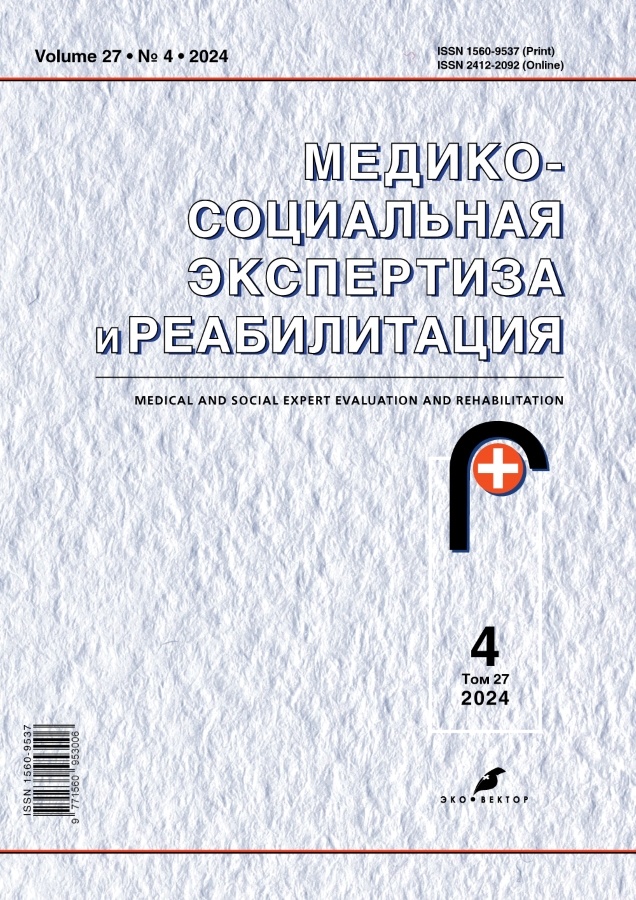Severity of impaired functioning, disability and health among hospitalized patients with non-psychotic disorders
- Authors: Petrova N.G.1, Vishnyakova E.V.1, Kalinina S.A.1
-
Affiliations:
- First Pavlov State Medical University
- Issue: Vol 27, No 4 (2024)
- Pages: 219-225
- Section: Original study articles
- URL: https://rjmseer.com/1560-9537/article/view/646709
- DOI: https://doi.org/10.17816/MSER646709
- ID: 646709
Cite item
Abstract
BACKGROUND: Mental disorders are currently a serious problem for society and require a systematic approach to prevention, treatment and rehabilitation. Among these disorders, 51.0% are non-psychotic. The application of the International Classification of Functioning (ICF) allows a fairly objective assessment of the severity of disorders that limit the life activity of patients and their dynamics, characterizing the effectiveness of treatment and rehabilitation. However, the use of the ICF in psychiatric practice is limited.
AIM: To evaluate the effectiveness of inpatient rehabilitation of patients with non-psychotic disorders based on the use of ICF.
MATERIALS AND METHODS: The object of the study was 317 psychiatric inpatients with non-psychotic disorders. The severity of life activity limitations according to the ICF at admission and discharge was studied. Inclusion criteria: age under 18; patient refusal to participate; acute psychotic symptomatology, gross cognitive defect. Statistical analysis was performed using application programs in Microsoft Office Excel 2010.
RESULTS: Women accounted for 59.9% (190 people) of those examined. In the age structure, people under 30 years of age accounted for 32.5% (103 people), 30–39 and 40–49 years — 21.8% and 20.2% (69 and 64 people, respectively), 50–59 years — 11.7% (37 people), 60 years and older — 13.8% (44 people). In the nosological structure, patients with neurotic, stress-related, and somatoform disorders accounted for 30.6% (97 people), mood disorders and personality and behavior disorders in adulthood — 25.3% (81 people) and 24.4% (74 people), respectively; with behavioral syndromes — 20.5% (65 people). The mean ICF scores at the beginning of treatment were: on impulse urges control — 1.52±0.19, emotion regulation — 1.59±0.18, motivation function — 1.40±0.21, appetite — 1.36±0.25, ability to overcome crisis situations — 1.90±0.19, coping with stress — 1,74±0.20, solving complex problems — 1.68±0.18, managing own activity — 1.59±0.16, regulating behavior during interaction — 1.07±0.22, maintaining child-parent relations — 1.12±0.18.
CONCLUSION: The use of ICF in psychiatric practice allows to determine the patient’s actual problems and their dynamics, which is necessary for the correction of therapy and assessment of its effectiveness.
Full Text
About the authors
Nataliya G. Petrova
First Pavlov State Medical University
Email: petrova-nataliya@bk.ru
ORCID iD: 0000-0002-9277-2109
SPIN-code: 1097-2943
MD, Dr. Sci. (Medicine), Professor
Russian Federation, St. PetersburgEkaterina V. Vishnyakova
First Pavlov State Medical University
Author for correspondence.
Email: vishnyakova_e79@mail.ru
ORCID iD: 0000-0002-4571-2859
SPIN-code: 2349-1789
Russian Federation, St. Petersburg
Svetlana A. Kalinina
First Pavlov State Medical University
Email: kalinina@spbcpo.ru
ORCID iD: 0000-0003-1033-5210
SPIN-code: 6820-0533
MD, Cand. Sci. (Medicine)
Russian Federation, St. PetersburgReferences
- Skripov VS, Esina KM. Comprehensive assessment of morbidity of mental disorders and behavior disorders in dynamics for the period 2015–2019 in the Russian Federation. Social Aspects of Public Health. 2021;67(4). doi: 10.21045/2071-5021-2021-67-4-8 EDN: NPIGEW
- Samoylova DD, Barylnik YB. Complex approach to the evaluation of treatment results of patients with paranoid schizophrenia. Vestnik neurology, psychiatry and neurosurgery. 2021;(2):59–64. doi: 10.33920/med-01-2102-05 EDN: UEPHME
- Rasulov AR. Effectiveness of psychiatric rehabilitation of schizophrenia patients on inpatient treatment. Journal of Neurology and Psychiatry named after S.S. Korsakov. 2021;121(2):13–17. doi: 10.17116/jnevro202112102113 EDN: HBXLED
- Ababneh ON. Social work with children and adolescents in psychiatry. Young Scientist. 2019;(6):164–168. EDN: YWWUDR
- Ivanova GE, Bulatova MA, Polyaev BB, Trofimova AK. Application of the international classification of functioning, limitations of life activity and health in the rehabilitation process. Vestnik Restorative Medicine. 2021;20(6):4–33. doi: 10.38025/2078-1962-2021-20-6-4-33 EDN: LFOBUL
- Ivanova GE, Bodrova RA, Komarnitsky VS, Builova TV, Karimova GM. Algorithm of formulating a rehabilitation diagnosis using the international classification of functioning to the patient who suffered a stroke: Clinical case. Physical and Rehabilitation Medicine, Medical Rehabilitation. 2022;(1):37–54. doi: 10.36425/rehab96918 EDN: FLURCZ
Supplementary files







